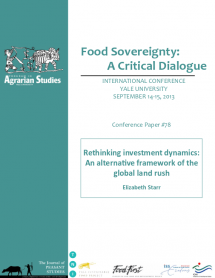Ideas into movement
Boost TNI's work
50 years. Hundreds of social struggles. Countless ideas turned into movement.
Support us as we celebrate our 50th anniversary in 2024.

Despite growing interest in “land grabbing,” the literature remains biased in several key ways, failing to capture the full diversity of land investments that have occurred in the last decade.

In particular, this paper identifies and analyzes three analytical blind spots in the comparative literature on land grab:
In drawing attention to these limitations, this paper constructs two typologies of land investment—one describing physical changes in land use, and another mapping interactions between investors and developing country actors. Working in conjunction, they help to explain why land deals occur where they do and how they change not only the land itself, but also people’s relation to the land.
Building on the work of Borras and Franco (2010) and Hall (2011), who examine how land use changes, the first typology accounts for nonproductive and speculative investments, which were often ignored in early land grab research. The principal contribution of this paper, however, is a second, novel typology, which maps the complex interactions between investors and a host of domestic actors—including the government and civil society organizations.
This paper thereby calls for a more nuanced analysis of the bargaining processes that underlie every land deal and also of the potential policy alternatives that may attract investment without sacrificing the livelihoods or lands of vulnerable local populations.
Elizabeth Starr, Independent researcher Liza Starr received her B.A. in Ethics, Politics, and Economics from Yale University. She is a research assistant to Professor Elisabeth Wood and conducts research on land concentration processes in the developing world, with a particular focus on Latin America. In September 2013, she will begin a new position as a research associate based out of the National University of Colombia, where she will be studying the Colombian land restitution process and land property rights.
Food Sovereignty: a critical dialogue, 14 - 15 September, New Haven.